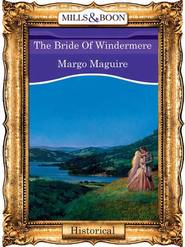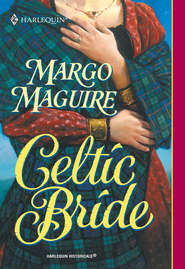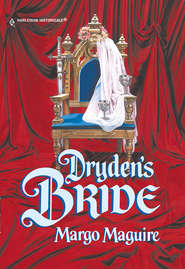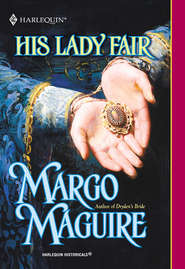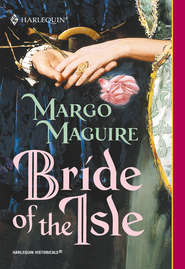По всем вопросам обращайтесь на: info@litportal.ru
(©) 2003-2024.
✖
Norwyck's Lady
Настройки чтения
Размер шрифта
Высота строк
Поля
He took Eleanor by the shoulders, turned her around and gently pushed her toward the door. When he saw that she’d gone down the first few steps, he turned back to Marguerite. “Do not think that I’ve finished with you.”
He followed his sister out of the room, closing the door behind him. Marguerite picked up the shawl and drew it ’round her shoulders, then collapsed in a chair near the fire. Confusion prevailed in her mind. Between the images of vaguely familiar people and places, and Bartholomew Holton’s formidable presence, she could not sort through her thoughts in any coherent manner.
She knew she should be frightened of the overtly hostile earl. She trembled in his presence and her heart pounded so loudly she believed he might even hear it. Yet her reaction was not one of fear. ’Twas one of…fascination.
She was attracted to the man.
Marguerite slid her lower lip through her teeth and frowned in consternation. She’d been the victim of his animosity ever since awakening to this nightmare of doubt and confusion, yet she knew he was not inherently wicked or mean. His demeanor toward his sisters had made that abundantly clear. Though he nearly managed to hide it, his tender feelings for the little girls showed every time they appeared.
His loathing was directed solely at her. And she did not understand why.
Marguerite drew her legs up under her, vowing that until she had a better grasp of her situation and why Bartholomew Holton was so antagonistic toward her, there would be no softening of her heart toward him.
Chapter Four
Morning dawned bright and sunny. Marguerite gazed out the window of her chamber and realized that her vision was completely clear. She could see a vast expanse of sandy beach, and make out several gulls flying high above the waves.
She sent a silent prayer of thanks that her vision had been restored. Now if only her memory would return…
On the opposite wall, another window overlooked a courtyard. Marguerite crossed the room and gazed down, anxious to see if all was clear there, too.
She saw a number of Norwyck’s knights on a practice field beyond the courtyard, engaged in swordplay. Several of the men were on horseback, and one in particular worked at a quintain at the opposite end of the courtyard. His movements were powerful, yet agile, striking quickly and mightily, then ducking the reprisal.
Marguerite knew at once that this man, wearing naught but a light undertunic that was damp with his exertions, was Bartholomew Holton. His hair was bound at his nape, and she sensed without seeing that his facial expression would be fierce.
A shudder ran through her and she whirled away from the window. Her unruly response to the young lord was unacceptable. The man had no liking for her, and she had no business having the kind of reaction he kindled in her. Besides, ’twas entirely possible she had her own young man or a husband waiting somewhere for her. Mayhap even children.
The thought of children gave her pause. Marguerite ran her hands down her bodice, across her breasts and to her belly. Had an infant once nestled in her womb? Suckled at her breast?
She did not think so, though she could not be certain. The children whose faces came to her at odd times must have some significance to her. Who were they? Why did she see them every time she closed her eyes?
Rather than dwell on a puzzle that served only to upset her, Marguerite pressed one hand to her heart and turned her attention elsewhere. She let her gaze alight upon the furnishings of the circular room.
The bed, she already knew, was a comfortable one, with rich linen fittings and warm woolen blankets. Two chairs flanked a stuffed settle near the fireplace, where a fire blazed cozily. There were two large wall hangings that Marguerite was able to see clearly now, beautiful, colorful tapestries depicting happy times.
A short, stuffed bench sat before the wash table, and a small mirror hung on the wall above it.
Two closed trunks perched against the wall opposite the bed, and upon inspection of the first, Marguerite discovered a cache of gowns, shifts and hose—among them the clothes Eleanor had brought up the day before. At the bottom were shoes, which Marguerite took out. When she tried to slip her feet in, she discovered a collection of jewels in the toes.
There were rings and chains of gold, with an assortment of colorful gems set into them. Marguerite weighed the pieces in her hands. Eleanor must have put them here, she thought. The child was well-meaning and eager to please, and just young enough that she would not understand the value of such jewelry.
Marguerite put the treasure into the toe of the hose, then placed the sock carefully at the bottom of the trunk. She would see that the gold and precious gems were returned to their rightful place as soon as she was able. In the meantime, she opened the other trunk to see if any more treasures awaited.
Inside were two musical instruments, a psaltery and a gittern. For some reason Marguerite could not fathom, these instruments seemed more precious to her than the gems she’d hidden away in the other trunk.
Carefully, she lifted them out and set them on the bed. Each instrument was beautifully made, from the highly polished wood to the tightly woven strings. Marguerite brushed her hand across the strings of the gittern, causing a discordant sound.
The instruments, the strings, the sounds, seemed familiar. She knew the gittern needed to be tuned, and she tightened or loosened the pegs accordingly. Afterward, when she strummed, it sounded right to her ear, though something was missing.
She did not have time to ponder the question, though, for the door to the chamber opened and Eleanor came in. “You have Mama’s gittern!” the child said as she approached the bed.
“Oh, ’twas your mother’s?” Marguerite asked. “I’m sorry. I’ll put it—”
“Nay, can you play it?”
“I…I don’t know.”
“Try.”
Marguerite took the neck of the instrument in her left hand and strummed the strings with her right, as she had done before Eleanor had come in. She placed the fingers of her left hand over different strings and elicited various notes when she did so. As she strummed the instrument, a pleasing sequence of sounds filled the room.
She knew how to play!
When Eleanor clapped her hands, Marguerite looked at the child in astonishment, then back at the gittern.
“Play another!”
“I…something is not…” Marguerite said, frowning. She was completely puzzled. She felt entirely at ease with the instrument in her hands, yet something was wrong.
“I know!” Eleanor turned, reached into the trunk and pulled out a small object. “Kathryn calls this a plec…A plec—”
“A plectrum,” Marguerite said, though she could not say how she had come up with the word. It had just suddenly appeared upon her tongue.
“Aye,” Eleanor said. “And when Kate tries to play, the sounds she makes…” The child wrinkled her nose and shook her head.
Marguerite took the quill from the child and began to play a tune, using the plectrum. The instrument now felt much more natural in her hands, and Marguerite sensed that she must have played many times before. When she noticed the calluses upon the fingertips of her left hand, there could be no doubt that she was a practiced musician.
“I forgot,” Eleanor said. “Sir Walter sent me to see if you are hungry. Are you able to come down and break your fast with us in the great hall, or would you rather have a tray up here?”
Marguerite hardly knew how to respond. She’d been cloistered in this tower room ever since awakening without her memory, and she felt strangely timid about leaving. “I don’t think your brother—”
“Bartie is training on the practice field with the rest of the knights,” Eleanor said, unconcerned. She lifted the lid of the trunk that contained the clothing, and pulled out a bundle of dark green cloth. “He will be out there for hours.”
Marguerite set down the gittern and took the gown from Eleanor. ’Twas a lovely creation of velvet, with contrasting panels of gold and white silk. “Did this belong to your mother?” she asked the child.
“Nay. To Bartie’s wife.”
“His…wife?”
“Aye,” Eleanor said. She stuck out her lower lip and looked away. “She died in spring.”
So that was the reason for Bartholomew’s hostility. His beloved wife had died, and here Marguerite was, an interloper in what must have been Lady Norwyck’s tower room. ’Twas no wonder he was not disposed to be friendly toward her, and Marguerite did not think ’twould be prudent to wear the late Lady Norwyck’s clothes.
“Mayhap your brother would be disturbed by seeing me in his poor wife’s gown.”
“Why?”
“Well, it might remind him of her.”







